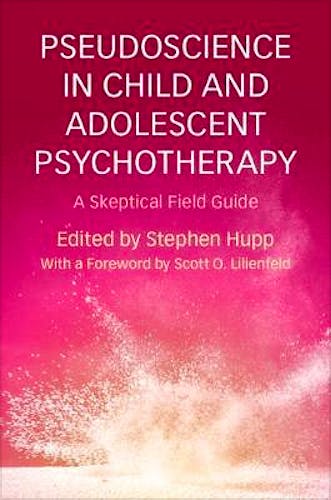

No hay productos en el carrito



Pseudoscience in Child and Adolescent Psychotherapy. A Skeptical Field Guide
Hupp, S.
1ª Edición Marzo 2019
Inglés
Tapa blanda
256 pags
500 gr
15 x 21 x 2 cm
ISBN 9781316626955
Editorial CAMBRIDGE
LIBRO IMPRESO
-5%
34,65 €32,92 €IVA incluido
33,32 €31,65 €IVA no incluido
Recíbelo en un plazo de
2 - 3 semanas
1. Critical thinking about psychotherapy Stephen Hupp, Jean Mercer, Bruce A. Thyer and Monica Pignotti
2. Intellectual and adaptive functioning Elizabeth M. Kryszak, Jessica F. Scherr and James A. Mulick
3. Autism spectrum Jessica F. Scherr, Elizabeth M. Kryszak and James A Mulick
4. Inattention and hyperactivity Christine A. Lee and Richard Milich
5. Learning Zachary LaBrot and Brad Dufrene
6. Tics Michael B. Himle and Brianna Wellen
7. Psychosis Rachel Waford and Carina A. Iati
8. Bipolar spectrum Guillermo Perez Algorta and Eric Youngstrom
9. Depression Thomas J. Huberty
10. Anxiety Bruce A. Thyer and Monica Pignotti
11. Obsessions and compulsions Monica Pignotti and Bruce A. Thyer
12. Trauma and attachment Jean Mercer
13. Feeding Linda J. Cooper-Brown, MaryLouise E. Kerwin and Keith E. Williams
14. Eating Frances Bozsik, Brooke Bennett, Emily Stefano, Brooke Whisenhunt and Danae Hudson
15. Toileting Michael I. Axelrod and Joseph P. Deegan
16. Sleep Stephanie Jackson and Sarah Morsbach Honaker
17. Disruptive behavior and conduct Jeremy Jewell, Madison Schoen, Sydney Thompson, Emily Fischer and Sarah Conoyer
18. Substance use Mariann Suarez
19. Earthings and skeptical psychology Stephen Hupp and Kathleen Dyer.
Most infants, children, and adolescents facing mental health challenges - including autism, psychosis, mania, depression, anxiety, and substance use - do not receive evidence-based treatments. Instead, they commonly receive ineffective and even harmful treatments. In this book, leading experts from the fields of clinical psychology, school psychology, developmental psychology, pediatric neurology, applied behavior analysis, and social work identify the most problematic psychotherapy interventions used for each mental health issue. In addition to these primary authors, each chapter includes a side bar from a specialist representing the disciplines of pediatrics, anthropology, neuroscience, and psychology. The contributors work in academia, hospitals, and private practice and include book authors, podcasters, and even a filmmaker. Not only does this book highlight the threats of potentially harmful pseudoscience, it also summarizes treatments that actually have a strong evidence base and deliver far more positive results.
- Reviews questionable, ineffective, and harmful treatments and provides evidence-based alternatives
- Includes side bars from interdisciplinary science communicators
- Informs readers on which treatments to avoid and which treatments actually work
Stephen Hupp, Southern Illinois University, Edwardsville
Stephen Hupp is Professor of Psychology in the Clinical Child and School Psychology program at Southern Illinois Universit,y Edwardsville (SIUE), and a licensed clinical psychologist. His other books include Great Myths of Child Development (2015), Great Myths of Adolescence (forthcoming) and Thinking Critically about Child Development (forthcoming). In 2015, he won the Great Teacher Award from the SIUE Alumni Association and he is an executive producer for the Science Moms documentary.
© 2025 Axón Librería S.L.
2.149.0